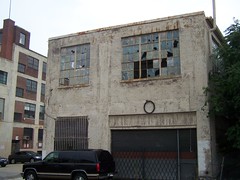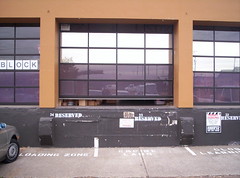Creative and business clusters
The New York Times reports, in "New York City Seeks to Shore Up Shrinking Garment District" of city plans to retain the Fashion District, by slimming it down to a smaller area and refocusing. This is necessary because manufacturing has for the large part moved off shore, and parts of the business cluster are hollowing out.
And the Chicago Tribune reports that the City of Chicago wants to seed new business development in the industrial space of old. See "Artists courted for idea factories: Old industrial district offers an affordable place to work."
As I have written before, most recently here, "Art, culture districts, and revitalization," DC people seem to have a hard time understanding the basic concepts of how innovation and economic development works, based on various ideas ranging from Everett Rogers on innovation diffusion to AnnaLee Saxenian on agglomeration benefits and industrial clusters, as well as the most basic ideas of Jane Jacobs, especially in Economy of Cities and Cities and the Wealth of Nations.

According to the Washington Business Journal, in "Report: D.C. must rethink economic development" certain quarters within DC are expressing concerns about the nature of our local economy, although I would argue that the "problem" is more complicated than the argument expressed by those quoted in the article. (I haven't read the original report yet, so I don't know whether or not I agree with its conclusions.)
The point made is that the DC government focuses on real estate development as its primary economic development strategy*. I guess that's true, but it's a tricky issue. From the article:
A strategic refocusing on job growth may be afoot. In recent weeks, Richard Bradley, executive director of the Downtown Business Improvement District, has been presenting the findings of a report he and Neil Albert, Santos’ predecessor, commissioned late last year to look at ways to craft a broader economic development strategy for the city and region.
Bradley said the message of the report, prepared by consultant McKinsey & Co., is clear: The Washington area can add jobs and improve their quality by focusing on industries primed for growth by the federal government.
“The city has been so focused on land development rather than on business development,” he said. “And we have been lucky because industries sort of naturally came to us. Well, we can’t rely on that anymore.”
Tops on the list are three sectors where the government is making or planning profound changes: finance, health care and energy. Some of this isn’t new. D.C. is already considering the possibility of adding “green” jobs, as many as 169,000 by 2018, according to an Office of Planning study.
But Bradley said the city needs to look at ways to become the place to be for companies and agencies addressing changes in other industries. For instance, D.C., home to the U.S. Department of Health and Human Services, could become the hub for the national movement to digitize medical records. And with the departments of Commerce and Treasury around the corner, finance represents a huge opportunity.
The reason that the quotes come across as a bit nonsensical is that the article reports that jobs based in DC have declined and that the Downtown DC BID is calling for a further focus on attracting federal government-related jobs in order to counteract this drop.
This is magical thinking. The federal government is based here already. Why are the number of jobs shrinking is the question that needs to be asked and properly answered.
It's for a number of reasons. Government jobs in DC are administrative for the most part, they are management-related jobs, they aren't jobs focused on creating or monetizing knowledge and product development and production.
Unlike universities like Massachusetts Institute of Technology or Stanford University (both universities are well-known for seeding their regions with engineering-related prowess and spinoff businesses), the universities located within DC are more focused on the social sciences. Yes, CUA and Howard do have engineering schools, and GWU, Howard, and Georgetown's medical schools also do some research, but none of these schools are known for seeding major businesses.
Except for the Naval Research Laboratory in SE DC, the big research agencies of the federal government (DARPA of the Dept. of Defense, National Institutes of Health, National Institute of Science and Technology, National Science Foundation) are based in the suburbs.
Similarly, the telecommunications-related businesses that located here either because of DARPA (which funded what became the Internet) or proximity to the FCC (to which they had to lobby incessantly for approval)--MCI, XM Satellite, WorldSpace, Intelsat, ended up not having enough of a critical mass to be able to survive here (there are a myriad of other reasons for this also).
If you want "doing-related" jobs in the city, we need to focus on government agencies and organizations that help to "make things" rather than manage. And on having the kinds of spaces that these kinds of businesses need in order to develop. I think that groups like the Downtown DC BID and the DC Economic Partnership are pointing out issues, but I don't think they understand how to address the issues that they uncover.

Empty warehouses on Channing Street NE, abutting the Metropolitan Branch/red line subway tracks.
(Note also that Catholic University kicks around the idea of building a research campus-tech park on land that they acquired from the Armed Forces Retirement Home. Similarly, some of the land/buildings on the AFRH campus could be used to seed science-engineering related business development. Plus these places are located near the Washington Hospital Center, which could be better leveraged for medical-related research and business development.)
For example, the Washington Post's Virginia Extra editions reported recently on how a science cluster of businesses is developing in the Ballston area of Arlington, in part because of how the National Science Foundation has located there. See "Science Firms Find Company In Ballston: Like-Minded Businesses Give Area Specific Brand."
Similarly, biotechnology businesses have located within the I-270 corridor in Montgomery County, because of the proximity of the National Institutes of Health, located in Bethesda. (See "Lost promise: Can region's shrinking biotech sector bounce back after big hits?" [subscription required for access] from the Washington Business Journal.)
In other words, for DC to become a center for various technologies, it needs to have technologists.
Relatedly then, for DC to take a leading role in computerizing medical records (something I wanted to do a tv show about in 1994, back when I did teleconferences about enterprise computing issues), you need a strong center for computer and software engineering.
Given today's Post article about the failures of an enterprise computing system to manage student scheduling for the Price George's County Public Schools, in "Scheduling Flaw Known Before School Started: Pr. George's 'Ran Out of Time' to Fix It," it's fair to say that our region isn't quite that center of expertise at the present time.
Although I will say that my first response to this article in today's Post, about attempts to get the Food and Drug Administration to relocate to Prince George's County from Montgomery County, see "HHS Might Move From Rockville to Prince George's: Developers Propose Sites Near Metro," was why shouldn't DC try to get the FDA to instead relocate to the Walter Reed Campus on Georgia Avenue in upper NW DC, as the federal government is giving up more of the campus than originally anticipated.
The Post article states that the HHS is seeking about 1 million square feet of office space. It's not that much in reality, translating to about 4,000 to 5,000 workers, but it's something...
--------------------
* Elsewhere, I have argued that there is a difference between "economic development" as conceptualized within typical economic development elements within Comprehensive Land Use Plans and "building a local economy."
Often, typical ED elements are happy with anything, not really concerned about more nuanced and wide ranging consideration of the various aspects that contribute to a balanced and growing local economy.
Some day, maybe I'll write a journal article about it. I hope to get a crack at doing some community economic development/strategy plans, where these ideas can be further developed.

Eastbank Commerce Center, Loading Docks, Portland Oregon.
Portland revised its industrial zoning code to preserve this kind of space by broadening the array of acceptable uses, such as software engineering and graphic design, rather than merely let all the properties be converted into housing. See this article, "East-side awakening," from a 2002 issue of the Portland Tribune.
Also see:
- Projects: Central Eastside: Portland Development Commission
- Central Eastside Industrial Council
- No Vacancy! Exploring Temporary Use of Empty Space in the Central Eastside Industrial District (a Portland State University student project)



0 Comments:
Post a Comment
<< Home